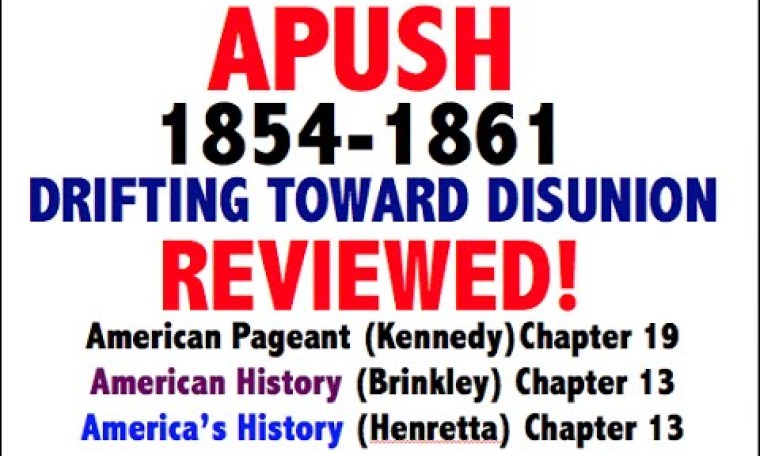
Win Your Next Pageant
Thank you for reading this post, don't forget to subscribe!Get Pageant Questions Written By A Miss Universe Judge
Review of American Pageant (Kennedy) Chapter 19, American History (Brinkley) Chapter 13, &
America’s History (Henretta) Chapter 13.
Check out the website for the slide notes
Topics: Drifting Toward Disunion: 1854-1861
Uncle Tom’s Cabin, Growth of Abolitionist Movement, Kansas-Nebraska Act, Topeka, Lecompton. Bleeding Kansas, Republican Party, Sack of Lawrence, Pottawatomie Creek, Sumner Beating, Election of 1856, Know Nothing Party, Lecompton Constitution, Dred Scott case, Lincoln-Douglas Debates, Freeport Doctrine, Harper’s Ferry, Election of 1860. Secession, Crittenden Compromise, Confederate States of America..(read more at source)
GET 365 FREE: Pageant Questions
CHECK OUT MORE: Pageant Coaching
ON SALE: Pageant Resale
LEARN ABOUT: Beauty Pageants



 Subscribe to Our RSS Feed
Subscribe to Our RSS Feed




im hereee
im here at 5
I watch your videos before every test. I swear it's like my teacher builds them off your videos. Perfect summaries. Ur a legend…
I have never cried doing homework before (except on third grade learning how to divide-dark times) and then Im on 11 grade crying and literally trembling because I couldn't understand how to write an essay… then I watched these videos and guess what? I actually understand now!!…. but I still can't write essays so Im still failing and still crying 🙂
Amazing video! I’m on the edge of my seat!
Fuck This Bs
these videos are the last thing I do to study for my test and as I'm watching I just nod along saying "yep yep I know that" and then there are times that are like "wait go back I didn't know that" LOL. Thank you so much for these videos they're the one way I feel like I'm prepared for my tests!
Like the swag
during the pandemic (2020), this video is a godsend. thank you for your precious work!
What is that sound at 4:28
Imagine being Charles Sumner
"Tell 20 friends about the channel" yeah, like I have that many
9:40 hanged not hung 🙂
Thank you for these videos <3
Bro your really saving my grades rn.
not even kidding, i watch your videos every morning before school because we have daily quizzes and they help SO much! thank you
Thank you for making AP US History interesting:)
You had me dying when you called Richard Taney "this ugly dude" 😂
Is there something like APUSH Crash Course Review for World History and Geography or US Geography? Studying for Social Studies CSETS 1&2 and want to go in solid.
Notes from the video to copy into your notes 🙂
APUSH Notes Ch. 19
Northern Resistance
-Uncle Tom’s Cabin by Harriet Beecher Stowe
-Inspires many to resist the Fugitive Slave Act
-Brought morality argument to the slavery debate
Result of Kansas-Nebraska Act
-It was assumed that Kansas would become a slave state and Nebraska would be a free state
-Pro slavery and anti-slavery flood into Kansas
-Two rival governments set up
→ Topeka: free soil
→ Lecompton: slave govt
Republican Party is formed as a response to the Kansas-Nebraska Act
Bleeding Kansas
-Sack of Lawrence 1856: Free Soil town attacked by pro-slavery forves
-Pottawatomie CreeK: John Brown attack pro slavery forces
-By 1856 there is a civil war in Kansas between pro slavery and anti slavery forces
The Beat Down
-Charles Sumner gives a speech condemning events in “Bleeding Kansas”
-Insults Senator Andrew Butler from SC
-Congressman Preston brooks of SC enters Congress and beats Sumner with a cane
-Violence from Bleeding Kansas spreads to the north
Election of 1856
-1st time Republican party runs a candidate for the Presidency
-James Buchanan (Democrat) wins
Lecompton Constitution
-1st challenge for President Buchanan
-Pro-Slavery
-Free Soilers boycott the election
-Supported by President Buchanan but rejected by Congress
Dred Scott Case
-Dred Scott was a slave who sued for his freedom
-Goes to Supreme Court in 1857, which is dominated by Southerners
-Ruled that: AAs are not citizens (so they could not sue) and are property
-Congress could not make laws regarding slavery in the territories
→ Missouri Compromise unconstitutional
Lincoln-Douglas Debates
-Abe Lincoln debates Stephen Douglas (D) for the Illinois Senate in 1858
-7 debates held
-Lincoln challenges Douglas on Dred decision: Could slavery be prevented in the territories
→ Dred Scott decision said no
→ Douglas takes the position that territories could limit slavery (Southerners are pissed)
-Results:
→ Douglas keeps Senate seat
→ Lincoln becomes national figure
→ Southerners are angry
→ Democrats will split in 1860
John Brown at Harper’s Ferry
-John brown hopes to spark a slave revolt in 1859
-Attempts to seize the federal arsenal at Harper’s Ferry
-Does not go well: charged w/ treason and hung
-Impact:
→ South is outraged
→ Brown becomes a martyr to abolitionists
→ Immediate cause of secession
Election of 1860 (Democrats Split)
-The issue of slavery had divided the Democrats
-N. dems favor Stephen Douglas (who likes pop sovereignty and enforces Fugitive Slave Act)
-S. Dems favor John C. Breckinridge (who wants slavery in the territories and wants to annex Cuba)
-Republicans pick Lincoln
→ No extension of slavery (for free-soilers)
→ Protective slavery (for northern manufacturers)
→ Pacific railroad (for the Northwest)
→ Free homesteads/land (for the farmers)
-Southern secessionists say they will leave the Union if Lincoln wins
Election of 1860 Results
-Republican party wins the Presidency for the 1st time
-Lincoln is a “minority President”: only 40 percent of pop. vote
-Southerners see him as a sectional President
→ not on ballot in 10 states
Secession
-SC votes to secede in Dec. 1860
-Eventually 7 southern states leave the union before Lincoln takes office
-Confederate States of America is formed (Jefferson Davis)
-President Buchanan does nothing to stop secession
→ Does not believe secession is legal, but still does nothing
Crittenden Compromise (Last Compromise)
-Last ditch attempt to avoid a major crisis
-Wants to bring back Missouri Compromise
-Lincoln rejects this because the position of the Republican party was no extension of slavery in the territories
Wow, this chapter thus far, is the only one that’s intriguing to me, so much going on.
Why on earth would free-soilers boycott the Lecompton Constitution election if they felt so strongly about, you know, establishing free soil? Even if there were unsavory terms in it. It seems like a glaringly stupid idea, frankly.
test average went up 10 points after watching these videos
Why did the Northern Whigs support the Fugitive Slave Act if the North hated it?
Not to flex but this guy is my teacher 🤩🤩
Jocz passes the vibe check
i’m not even in an APUSH class, just an honors yet we use this book!! ughh it sucks so much!! but thanksss soo much for these videos they keep me from failing!!
8:35 lol the southerners gotta stop being so BUTTHURT !
I genuinely wonder how biased the American Pageant is…
I could be wrong, but I believe the pro-slavery government was set up in Shawnee Mission, NOT Lecompton
https://www.apnotes.net/notes-12e/ch19-12e.html
^^refer to the second paragraph. The Lecompton Constitution was likely drawn up in Lecompton, but the pro-slavery puppet government was in Shawnee Mission.
thank you so much! you saved me so much time!!!
These videos saved me in APUSH!
Thanks 🙂
Apush Final tmw!!! Wish you guys luck and myself luck lol
Omg where is chapter 20 I need more videos
Getting ready for the exam.
Sir you are a saint
when he said what's poppin for a second i thought he was making a vine reference
THIS MAN IS A GOD…
Great video!! I was wondering if you could answer a question. I heard that Lincoln wasn't only there to get rid of slavery, but to save the Union and keep it joined; that was his main role. But then why would he reject the Crittenden Compromise if it was the only thing that could hold the Union together?